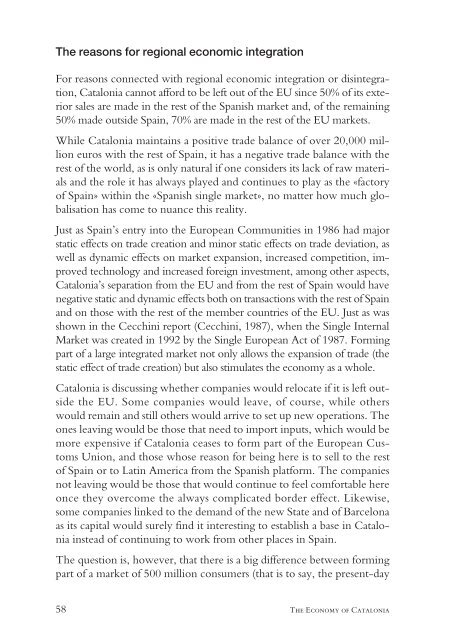The Economy of Catalonia
the_economy_of_catalonia._questions_and_answers_on_the_economic_impact_of_independence
the_economy_of_catalonia._questions_and_answers_on_the_economic_impact_of_independence
Create successful ePaper yourself
Turn your PDF publications into a flip-book with our unique Google optimized e-Paper software.
<strong>The</strong> reasons for regional economic integration<br />
For reasons connected with regional economic integration or disintegration,<br />
<strong>Catalonia</strong> cannot afford to be left out <strong>of</strong> the EU since 50% <strong>of</strong> its exterior<br />
sales are made in the rest <strong>of</strong> the Spanish market and, <strong>of</strong> the remaining<br />
50% made outside Spain, 70% are made in the rest <strong>of</strong> the EU markets.<br />
While <strong>Catalonia</strong> maintains a positive trade balance <strong>of</strong> over 20,000 million<br />
euros with the rest <strong>of</strong> Spain, it has a negative trade balance with the<br />
rest <strong>of</strong> the world, as is only natural if one considers its lack <strong>of</strong> raw materials<br />
and the role it has always played and continues to play as the «factory<br />
<strong>of</strong> Spain» within the «Spanish single market», no matter how much globalisation<br />
has come to nuance this reality.<br />
Just as Spain’s entry into the European Communities in 1986 had major<br />
static effects on trade creation and minor static effects on trade deviation, as<br />
well as dynamic effects on market expansion, increased competition, improved<br />
technology and increased foreign investment, among other aspects,<br />
<strong>Catalonia</strong>’s separation from the EU and from the rest <strong>of</strong> Spain would have<br />
negative static and dynamic effects both on transactions with the rest <strong>of</strong> Spain<br />
and on those with the rest <strong>of</strong> the member countries <strong>of</strong> the EU. Just as was<br />
shown in the Cecchini report (Cecchini, 1987), when the Single Internal<br />
Market was created in 1992 by the Single European Act <strong>of</strong> 1987. Forming<br />
part <strong>of</strong> a large integrated market not only allows the expansion <strong>of</strong> trade (the<br />
static effect <strong>of</strong> trade creation) but also stimulates the economy as a whole.<br />
<strong>Catalonia</strong> is discussing whether companies would relocate if it is left outside<br />
the EU. Some companies would leave, <strong>of</strong> course, while others<br />
would remain and still others would arrive to set up new operations. <strong>The</strong><br />
ones leaving would be those that need to import inputs, which would be<br />
more expensive if <strong>Catalonia</strong> ceases to form part <strong>of</strong> the European Customs<br />
Union, and those whose reason for being here is to sell to the rest<br />
<strong>of</strong> Spain or to Latin America from the Spanish platform. <strong>The</strong> companies<br />
not leaving would be those that would continue to feel comfortable here<br />
once they overcome the always complicated border effect. Likewise,<br />
some companies linked to the demand <strong>of</strong> the new State and <strong>of</strong> Barcelona<br />
as its capital would surely find it interesting to establish a base in <strong>Catalonia</strong><br />
instead <strong>of</strong> continuing to work from other places in Spain.<br />
<strong>The</strong> question is, however, that there is a big difference between forming<br />
part <strong>of</strong> a market <strong>of</strong> 500 million consumers (that is to say, the present-day<br />
58 <strong>The</strong> <strong>Economy</strong> <strong>of</strong> <strong>Catalonia</strong>


